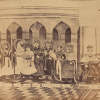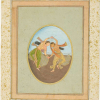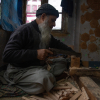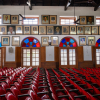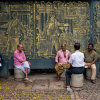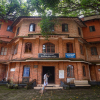Professor Choudhury is also an educationist, a published author, poet, orator and actor who has contributed widely in the field of arts and culture in Assam.
Ankush Bhuyan (AB): Sir, when was your introduction to Jyotiprasad Agarwala?
Prof Amarjyoti Choudhury (AC): It was through recitation of his poems. His poetry has the distinction of always rhyming, so it was easier to recollect and fun to recite. At first, I did not understand the philosophy behind it, I must admit, when I was a child. From class three or four, I have been reciting Jyotiprasad’s poems, and this has been my introduction to him, not only the man but the philosophy he represents.
AB: Why is Jyotiprasad Agarwala important for modern Assamese history—as a figure—as an icon?
AC: This is because he brought many new elements to our culture, I mean, both art and culture. First of all, he appreciated our culture, and from there he took on the basic essences and created songs or, for example, plays, which were typically Assamese in character, and could represent our hopes and aspirations.
But then he also had two very different distinct traits: the first one is that even though he was firmly rooted in the soil of Assam, he stood out as someone who is an ardent admirer of the philosophy of world citizenship. He believed that the world is one, all people are one, to him everybody was equal. At the same time, he was also advocated the concept of self-determination of people. But when you talk about the idea of one language, one people, that idea comes in direct conflict with the idea of self-determination. How to resolve this dichotomy? This was his strategy, and this he placed before the people of Assam through his ideas of art and culture, and, I believe, this is his greatest contribution.
AB: And what were some of his significant contributions?
AC: I will just say one line in Assamese: ‘gaonor gondite thaki, upoji hoi ahu bisho nagorik’, which means that ‘though I stay in the confines of a village, I can emerge as a world citizen’—and this is the first philosophy that he has talked about. He also talked very poignantly about the creation of the universe, and from the creation of the universe, he derived the idea that the world is so beautiful, and then when he looks at nature, he finds nature is so beautiful. However, when he looks at society that sort of beauty is not there, because of inequality amongst people, this was another part of his philosophy.
All his writings and poetry was geared towards bringing about equality among people, equality of men and women. It is very strange that even during that time, in the fifties, the idea of equality of women, that concept was simply not there in Assam, but he brought it in his plays, in his poems. And also the synergy amongst the different indigenous people of Assam—this is given prominence in his works. This is how, as I said, he combined the idea of world citizenship with the concept of self-determination.
AB: Can you talk a little about his equation and friendship with Bishnu Prasad Rabha, because they seem to have worked and collaborated together; do you have any idea how they met, or how they worked together or what they did together?
AC: I have never met Jyotiprasad Agarwala, but then I have had the opportunity to interact with Bishnu Prasad Rabha in my youth, and through him I came to know about his association with Jyotiprasad Agarwala. Initially, their association was established while working on plays and films together, but then because both of them shared similar set of ideas they developed a close association.
AB: What was like in that time, what I am trying to know is what was there before and what was the new thing that they did in terms of technique?
AC: I will give some examples. First of all, he tried to bring introduced the use of local folk tunes in the modern Assamese songs. Why did he do this? Was it just because folk songs were available and he merely copied? It was not like that; both Jyotiprasad Agarwala and Bishnu Prasad Rabha believed that these folk songs represent the basic urge of human beings. So, when you use these tunes, the kind of response that you get will be quite different from when you use tunes that you borrow from somebody else, although it might sound very nice. That is why he has used lullabies of Assamese people to start with, although philosophically these songs were meant for much older people. He used it and showed us that by using it the songs gain more strength, and immediately tugs at the heart of the people. Thus, he found new ways to express his philosophies.
Even in films, for example, Jyotiprasad broke new barriers. If you look at Joymoti, there also for the first time I have seen, which I have not in most other Assamese films, that he uses space demarcation to project a certain kind of meaning.
AB: Tell us, did Jyotiprasad achieve any recognition during his lifetime, or did he posthumously become a cultural icon?
AC: Initially, from what I heard from Bishnu Rabha, both these men had to struggle a lot. Jyotiprasad’s film, in fact the first Assamese film, Joymoti, was released with much difficulty. It was only towards the later part of their lives, that they were awarded the due respect and recognition for the philosophies they promoted, the new ideas they brought in, and the new techniques they brought in songs, films and plays.
AB: After Jyotiprasad’s demise, was it the government who took forward his legacy or was it the people, or was it his friends like Bishnu Prasad Rabha?
AC: Definitely, the presence of Bishnu Prasad Rabha and a very young Bhupen Hazarika helped propagate his ideas in the Assamese society. But, I believe, his ideas had such strength in them— awakened the society to larger feelings and greater understanding of life altogether—that they survived nonetheless in the hearts of the Assamese people. That is why it is the people, and not merely government efforts or the efforts of one organisation or the other, who can be credited with keeping him alive in the horizon of Assamese culture.


